Spider-view: "Guilt by Association"
A few B-list characters take center stage and receive some surprising development in what could have been a basic filler story
—by Nathan on April 24, 2025—
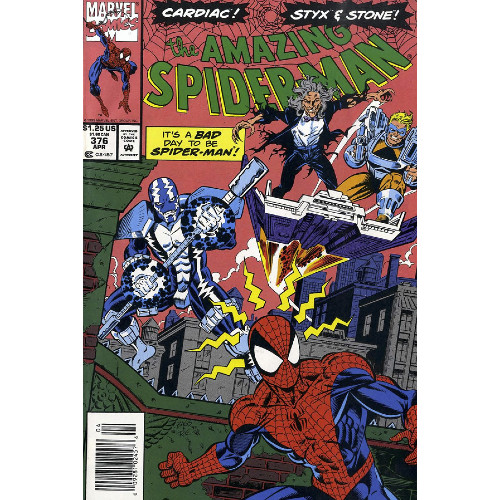
We get a bit of a break from the Venom side of things this time around: while Eddie Brock makes a new home for himself on the West Coast, Peter Parker has returned to New York to shake off images of snaky black tendrils and armored doomsday preppers.
Regular Amazing Spider-Man contributors David Michelinie and Mark Bagley get a bit of a break, too, maybe to focus on settling Venom into San Francisco in his first-ever limited series. Though Michelinie supplies the plot for this two-parter, writing duties are taken over temporarily by Steven Grant, who is probably best known for writing The Punisher's own first-ever limited series, co-writing Contest of Champions, and for creating Whisper, a female ninja who was first published by Capital Comics alongside Mike Baron's Nexus and Badger.
I've read very little of Grant's work, save for Contest and a Marvel Two-in-One issue where he pitted Moon Knight and the Thing against the assassin Crossfire. So I entered this narrative with very neutral expectations–Grant's is not a name I've had enough experience with to associate with either positive or negative adjectives. I wasn't sure what to expect.
A two-part narrative in the middle of an ongoing series generally written and illustrated by a fairly successful duo at this time is hardly grounds on which to establish a sufficient opinion of a writer. I am, however, glad to note that I walked away from this narrative with greater appreciation than when I entered. And with a narrative whose cast includes medical professionals, I think that's a pretty decent diagnosis.
"Guilt by Association"
Writer: Steven Grant (scripter), David Michelinie (plotter)
Penciler: Jeff Johnson
Inkers: Dan Panosian, Al Milgrom, Randy Emberlin
Colorists: Bob Sharen and Kevin Tinsley
Letterer: Rick Parker
Issues: Amazing Spider-Man #376-377
Publication Dates: April 1993-May 1993
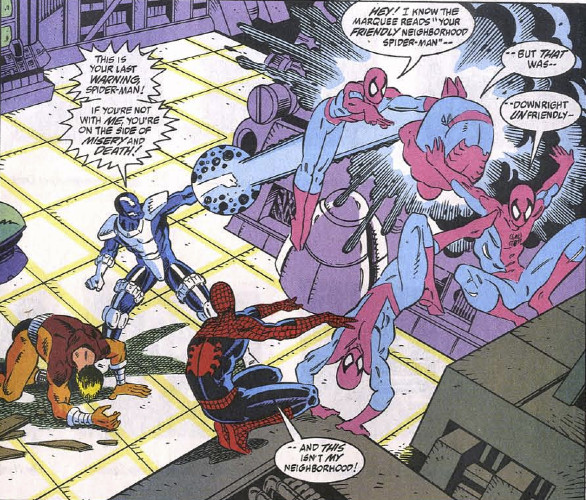
This is a tale of two doctors.
And it's handled with some surprising surgical precision.
Even before opening these issues, I assumed I wouldn't be expecting much. The sight of three characters on the cover of ASM #376–Cardiac, Styx, and Stone–made me shrug a little in disinterest. I've discussed each of them before, outlining Cardiac's vigilante quest and Styx and Stone's first appearance, but I consider each character a relic of their time. None of the three men have made what I would call significant appearances since the 90s, with Cardiac at least showing up for an arc in Dan Slott's original Superior Spider-Man series. They feel like products of a bygone era, particularly with Cardiac's armor and Stone's armaments–dude carries a couple big ole guns like he's auditioning to be an Image Comics villain. On the surface, none of these characters are quite interesting.
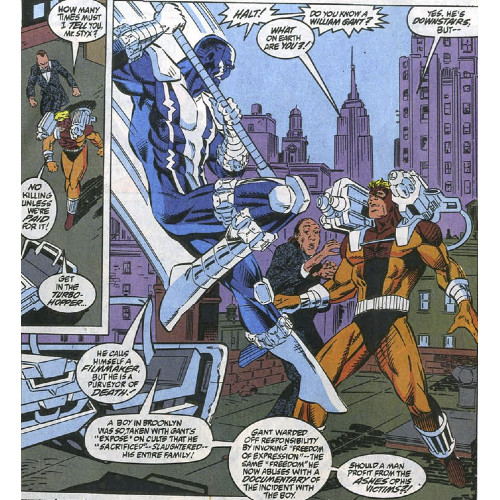
Yet, much like a mere flesh wound can hide deeper damage beneath the skin, the unsurprising sheen covers over some well-executed narrative qualities. I don't know how much involvement Michelinie had with the narrative, but Grant handles the writing duties with aplomb, leaning away from Michelinie's cheesier brand of snippy one-liners and embracing a writing style with more gravitas. Jokes are to be found here, for certain, as Spidey keeps up with his patent-pending parade of pithy puns and quips, but they feel considerably more constructed than what Michelinie tends to provide. Michelinie, I feel, grabs at the low-hanging fruit or most obvious responses or retorts, whereas Grant provides a bit of additional thought to his material. Spidey's witticisms feel fluid, popping two or three gags per panel in some places and maintaining a decent rhythm Michelinie tends not to match.
Grant delivers a couple darn good lines in the script, little beats which might make the reader pause to better reflect on his overarching narrative/theme/message. You are what you do, and your intentions don't mean squat, Spidey thinks to himself after Cardiac flees one battle with Styx and Stone. The line nicely highlights the difference Peter sees between himself and other vigilantes, like the Punisher or even Venom, who are more willing to inflict pain or even death to stop criminals from hurting others. In this case, the vigilante in question is Cardiac.
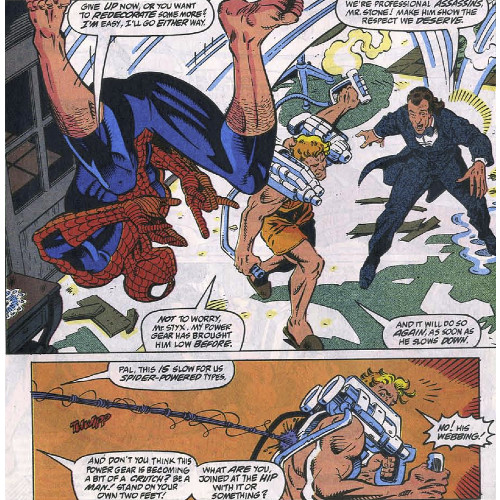
We're given three decent examples along a spectrum of morality here: you've got Spidey on one end, the noble hero who uses violence whenever necessary yet fights to bring criminals to lawful justice; he decries Cardiac's more lethal measures and even encourages the doctor-turned-vigilante to come back across the threshold ("Start crossing those ethical lines, pal, it gets awfully hard to find your way back," he tells Cardiac in the second issue). Stone exists on the opposite end of the spectrum, having forsaken his own noble medical pursuits in favor of a more selfish, opulent lifestyle funded by his parading around as a costumed mercenary. There is a "two sides of the same coin" sense to Cardiac and Stone–Dr. Elias Wertham (Cardiac's alter ego) is still very much a medical professional, enhancing his activities through his costumed vigilantism, though his heroism places him squarely in the middle of the aforementioned spectrum; Stone is very much not a medical professional any longer, forsaking his Hippocratic oath for the aforementioned parading.
Both men are, in some sense, hypocrites–Dr. Wertham forsaking the "do not harm" aspect of his oath for some rough-and-tumble action as Cardiac, and Stone claiming to aid his friend Styx by redirecting his "death touch" to murdering other folks (and, hey, if he makes a little profit off their missions in the end, bonus!). Grant weaves some decent complexity into both characters. You find yourself sympathizing for Stone's situation while condoning him profiting off his friend's condition, and you find yourself cheering for Elias to reshape his fellow doctor while knowing his intentions aren't completely altruistic. "You're not the only man capable of compassion," Elias tells Stone when they meet out of costume, and though this is certainly true, what can be questioned is the extent of their compassion…how much are these men playing a larger game for themselves? It's this tension which enables Grant to keep the story engaging, and it's the reader who will want to kick Elias under the table for his fruitless cynicism.
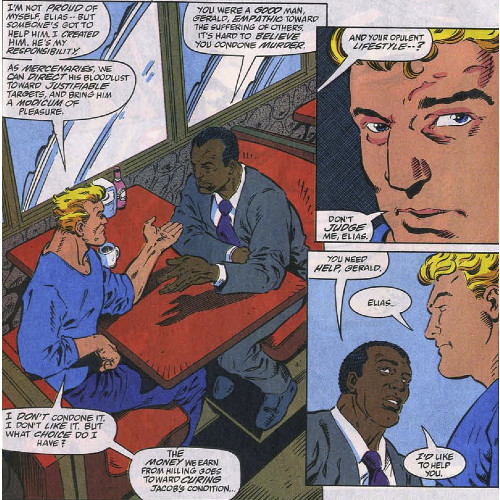
The antagonists take center stage in this narrative, leaving Spidey little to do other than battle all three men. Peter gets a little bit of time to interact with his wife and parents, and fortunately, Grant veers away from another Michelinie trope: tying the story's overarching themes to trouble in Peter's life. Michelinie isn't the only writer who does this, though I'd say he's guilty at stretching the concept more than others, trying to find some way for the Spidey/villain conflict to parallel Peter Parker's problems. Can it work? Sure, at times, but Grant wisely forgoes any attempts and just gives us a few decent scenes with Peter and the family. There isn't much development on the "Who are Peter Parker's parents really?" narrative, which is fine for now.
No mysteries, no symbiote-clad supervillains. Michelinie, to his credit, does have his favorite Spidey aspects which he peppers his narratives with pretty consistently, creating longer arcs which develop decently. But for now, we get a break from the frenetic action Michelinie deals with, turning instead to a couple characters I wouldn't have given second thought to. Grant deals nicely with Cardiac, Styx, and Stone, allowing the medically-minded men some additional development and causing their philosophies to clash. You may not necessarily find yourself on either side of the argument and perhaps that's what Spidey's for, providing a counterbalance to their hypocrisy. Stone and Cardiac clearly have those lines they don't have problems with crossing, and last I checked, doctors are supposed to use scalpels to open you from the front, not stab you in the back.